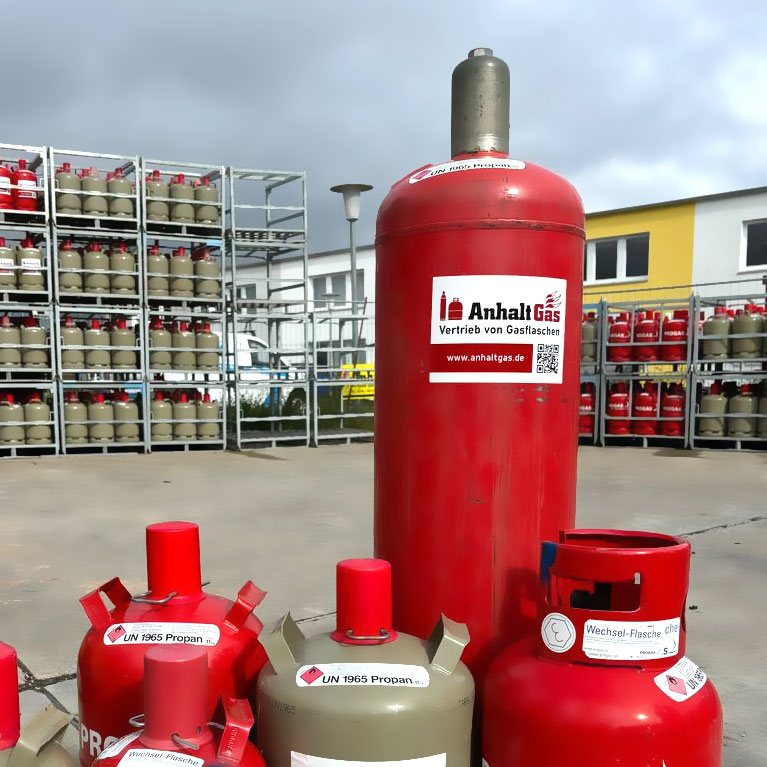Proper handling of propane cylinders is not only about convenience—it is a matter of safety. Whether you use small cylinders for camping or large ones for commercial kitchens, following strict guidelines ensures accident prevention and compliance with German and EU standards (e.g., TRF, DIN EN 1442, and ADR transport rules). This guide explains safe storage, leak detection, valve handling, and key legal obligations.
Why Propane Safety Matters
-
Propane is highly flammable and heavier than air, meaning leaks can accumulate at ground level.
-
Mishandling can lead to fires, explosions, or suffocation hazards.
-
Compliance with regulations (e.g., German Betriebssicherheitsverordnung and DGUV guidelines) protects both users and businesses.
1. Safe Storage Guidelines
-
Always upright: Cylinders must be stored vertically to keep the safety valve functional.
-
Ventilation required: Store in well-ventilated, shaded areas—never in basements or living spaces.
-
Distance rules: Keep at least 1 meter away from heat sources and flammable materials.
-
Protect from impact: Secure cylinders from falling or rolling, especially during transport.
Checklist: Storage
✔ Vertical and stable position
✔ Outdoors or in ventilated cages
✔ Protected from direct sunlight
✔ Away from ignition sources
2. Leak Detection and Prevention
-
Soap solution test: Apply soapy water to valves and connections—bubbles indicate leaks.
-
Never use open flame: Matches or lighters must not be used for testing.
-
Odor recognition: Propane is odorized with ethyl mercaptan (smells like rotten eggs) to detect leaks.
-
Regular checks: Inspect hoses, regulators, and seals for wear.
3. Correct Valve and Regulator Handling
-
Open the valve slowly to avoid sudden pressure release.
-
Always use certified regulators (DIN/DVGW approved).
-
Close valves when cylinders are not in use, especially before transport.
-
Replace defective valves or regulators immediately.
4. Transporting Cylinders Safely
-
Use approved cylinder carriers or secure them upright in vehicles.
-
Keep windows open during transport to ensure ventilation.
-
Never transport cylinders in the trunk of a closed car.
-
ADR regulations apply above certain quantities (e.g., >333 kg propane).
5. Common Mistakes to Avoid
❌ Laying cylinders horizontally
❌ Storing in cellars or enclosed spaces
❌ Using damaged hoses or regulators
❌ Overfilling or tampering with safety valves
6. Regulatory Framework (Germany & EU)
-
DIN EN 1442: Construction and testing of refillable steel cylinders
-
TRF (Technische Regeln Flüssiggas): Technical rules for LPG use in Germany
-
ADR: International transport regulations for dangerous goods
-
DGUV Vorschrift 79: Accident prevention rules for handling LPG
7. Frequently Asked Questions (FAQ)
Can I store propane in my garage?
Only if the garage is ventilated and complies with TRF rules. Underground garages are not allowed.
How often must cylinders be inspected?
Every 10 years for refillable cylinders, with a stamp on the collar showing the next test date.
Can I use a propane cylinder indoors?
Yes, but only in compliance with specific TRF requirements and with approved appliances.
Conclusion
By following these guidelines—proper storage, careful valve handling, regular leak detection, and strict regulatory compliance—you not only protect lives and property but also ensure long-term reliability of propane use. Always purchase and refill cylinders from certified providers and never cut corners when it comes to safety.






No comment